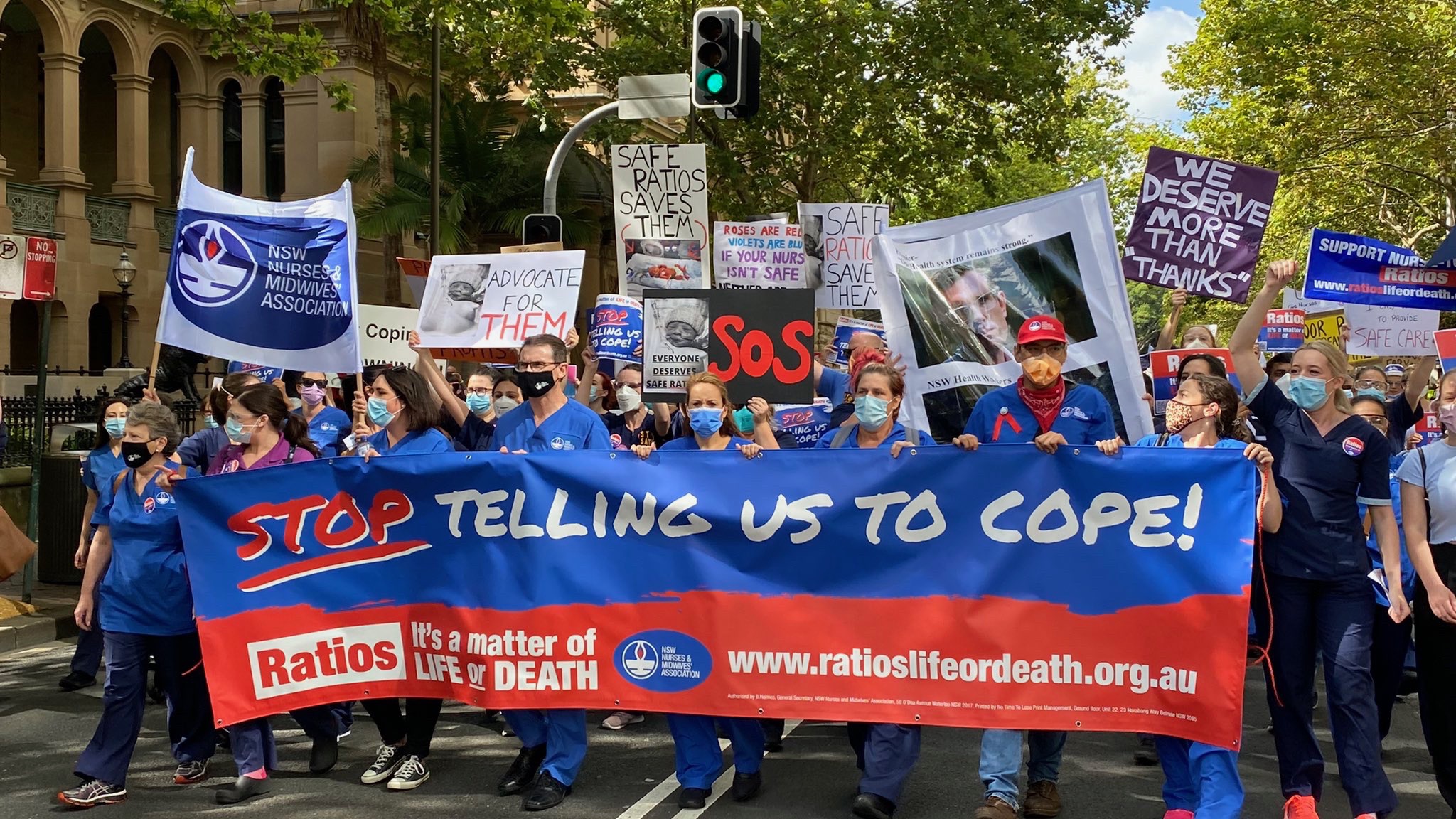Thousands of nurses in Australia’s most populous New South Wales State went on strike in a bid to highlight serious staffing shortages and stagnating wages of health workers. On Tuesday, February 15, tens of thousands of nurses in 150 public healthcare facilities across New South Wales staged a 24-hour general strike for the first time since 2013.
On Tuesday, around 5,000 of the striking nurses marched in State capital Sydney to the State parliament building with banners that read “Stop telling us to cope.” Large protest rallies were also held in at least 30 regional and rural medical centers across the State. The industrial action is one of the largest nurses’ strikes that the State has witnessed.
The strike was organized by New South Wales Nurses and Midwives’ Association (NSWNMA), a union representing 48,000 nurses and midwives working in public hospitals in the State, as well as close to 72,000 health workers. An overwhelming majority of nurses, close to 97% in over 200 NSWNMA branches, voted last week in favor of the strike.
Among the key demands put forward by the nurses is safe staffing measures, which would include a cap on nurse-to-patient ratio similar to States like Victoria and Queensland, and a wage hike of 2.5% to compensate for the extra work and risk imposed on health workers.
“Burnout from the COVID-19 pandemic and fed up with the NSW government’s refusal to prioritize safe staffing in public hospitals and health services, NSW Nurses and Midwives’ Association (NSWNMA) members stood in solidarity and declared to the NSW Premier their goodwill was over,” read the NSWNMA statement released on the day of the strike.
The strike vote was approved by the union just days after the government restarted non-urgent elective surgeries, including those requiring overnight stay, to 75% capacity of the pre-Omicron induced surge. This was done despite a major shortage of healthcare workers.
Nearly 2,800 health workers have been absent because of COVID-19 exposure, while over 1,000 workers either resigned or were expelled after refusing vaccination. According to the government’s own data, the number of staffed intensive care units has actually come down in the State compared to the start of the pandemic.
Even though the government claims to have invested in adding over 5,000 nursing staff between 2019 and 2022, staffing shortages remain a major issue across hospitals. Nurses have also complained of long working hours, sometimes as long as 12 hours at a stretch, due to these shortages. Workers are also opposing the Workers’ Compensation Act which would require those who contract COVID-19 to prove that it happened at their workplaces to receive compensation.
The conservative State government led by premier Dominic Perrottet of the Liberal-National Coalition attempted to scuttle the strike. The NSW Industrial Relations Commission, endorsing the government’s excuse of possible health services disruption due the strike, issued an order on Monday, February 14, asking nurses to call off the strike. Nurses defied the order.
NSW Health, which oversees public hospitals and healthcare services, even defended the current staffing and shift policies in government hospitals, arguing that the “flexible ratio system” allowed for better patient care. But nurses have narrated abysmal conditions in the system.
“Midwives are unable to provide the minimum standard of care women and babies deserve,” said Sarah Morton, an NSWNMA organizer from Wollongong Hospital. “The pride we used to feel in where we work, and serving our community, is dwindling because we are embarrassed by how broken the system is.”
“This staffing crisis in our health system should never have happened and could have been avoided if those sitting in that building had listened to us,” said NSWNMA general secretary Brett Holmes. “For over 10 years, we have campaigned for shift-by-shift ratios for nurses and better staffing for midwives because we know ratios work, they save lives and save money.”
“Our role is not to simply stay at the bedside keeping patients alive – we have a duty to everyone in our care to stand up and speak out, especially those unable to do so for themselves,” Holmes added.





